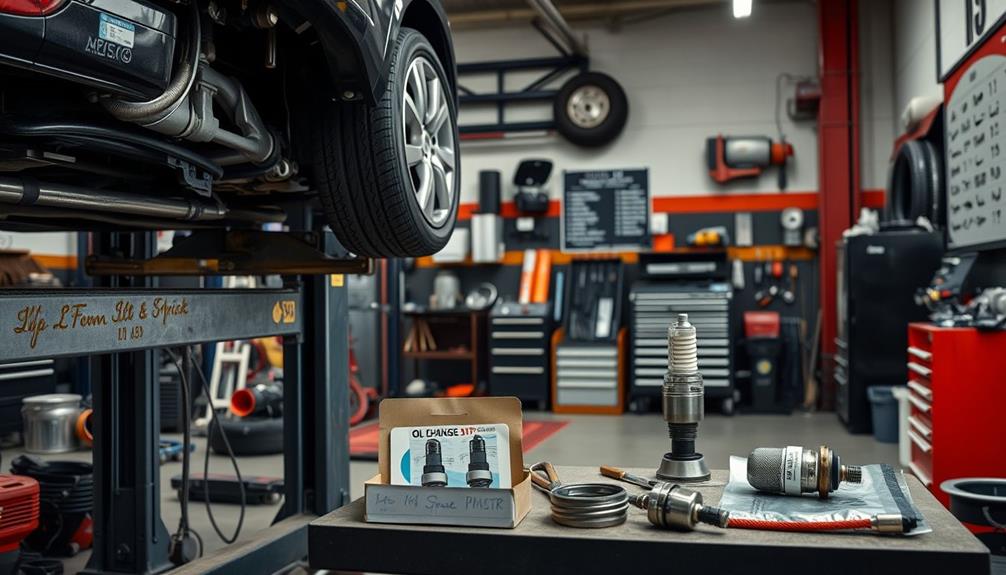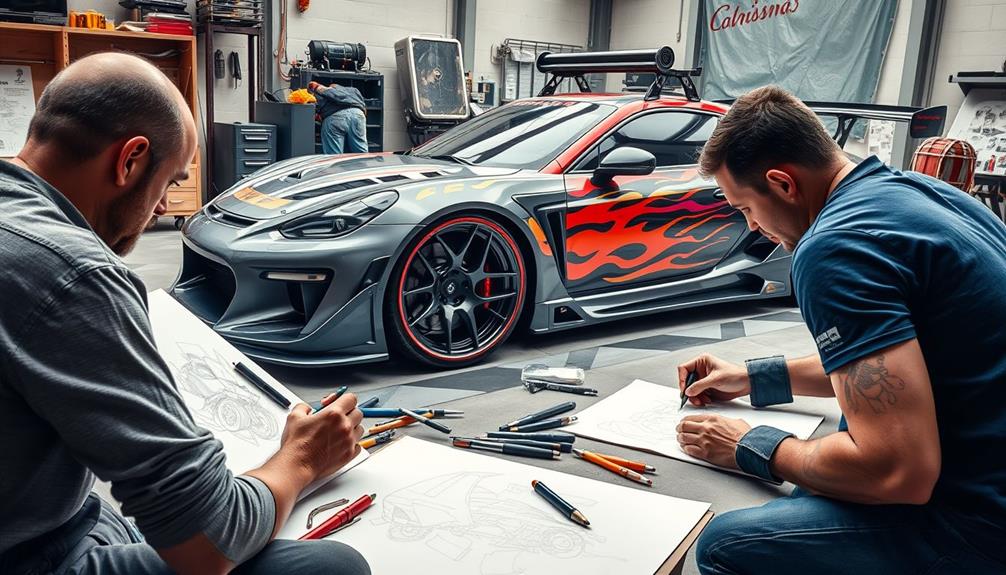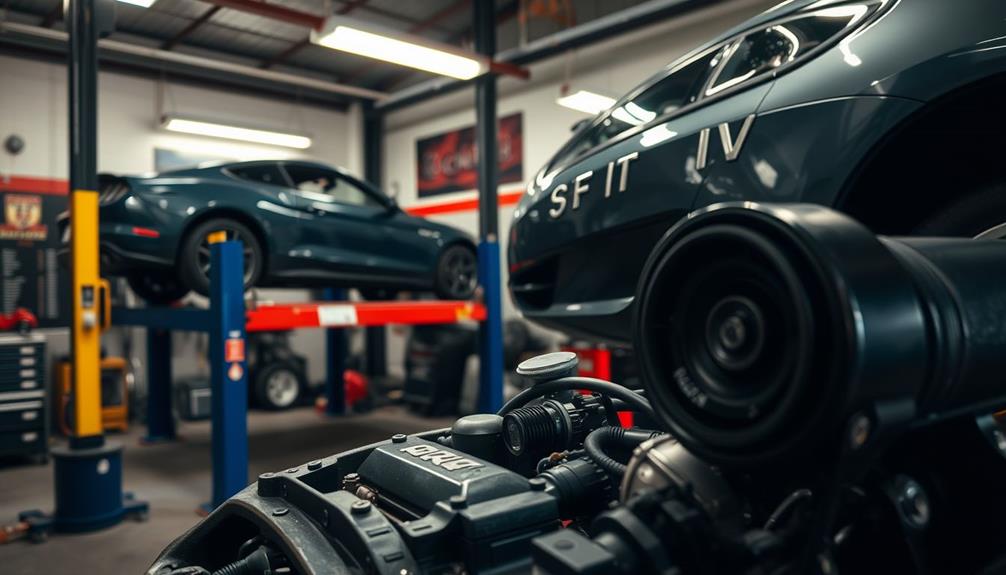Before getting your car tuned, it's important to take a few essential steps for ideal results. Start by conducting a full diagnostic check to identify any existing issues. Inspect your vehicle's fluid levels, cooling system, and engine oil to guarantee everything's in top shape. Set clear modification goals and choose compatible aftermarket parts. Review warranty guidelines to avoid complications. Finally, select an experienced upgrade partner known for quality parts and transparent communication. By following these steps, you'll pave the way for a successful tuning experience that meets your performance expectations. There's more to explore on how to enhance this process effectively!
Key Takeaways
- Conduct a full diagnostic check to identify and resolve any existing mechanical issues before tuning your car.
- Perform a thorough vehicle health assessment, including checking fluid levels, leaks, and sensor functionality.
- Use high-quality, high-octane fuel to enhance combustion and overall performance during the tuning process.
- Define clear modification goals to guide the selection of compatible aftermarket parts and tuning strategies.
- Choose an experienced upgrade partner who emphasizes transparent communication and provides quality parts for optimal results.
Importance of Preparation
When it comes to tuning your vehicle, preparation is key. You want to guarantee that everything's in top shape before diving into modifications. One of the most important things you can do is conduct a full diagnostic check. This helps you identify any existing mechanical issues, which you should address before tuning. Ignoring these could lead to costly mistakes down the line.
Another vital step is understanding your vehicle's specifications and current modifications. This knowledge enables you to select compatible aftermarket parts that align with your tuning goals. You wouldn't want to waste time and money on parts that won't fit or perform as expected.
Additionally, a thorough vehicle health assessment is essential. Check for leaks, and verify your oil and coolant levels are where they should be. This can prevent unexpected issues during the tuning process.
Vehicle and Warranty Considerations

Before diving into any modifications, it's vital to understand your vehicle's warranty details. Many upgrades can impact the validity of your warranty, so you'll want to verify that your planned modifications comply with warranty guidelines to avoid unexpected costs or denial of coverage. Keeping detailed receipts and documentation for all modifications is significant, as these may be required for warranty claims or future reference.
Additionally, existing modifications can affect compatibility with new parts. Disclosing any aftermarket components to your tuner can help avoid complications during the tuning process. Familiarizing yourself with your vehicle's performance specifications will also aid in selecting appropriate aftermarket parts that align with warranty requirements.
Here's a quick reference table to reflect on when evaluating your warranty before tuning:
| Warranty Aspect | Importance | Tips |
|---|---|---|
| Modifications Allowed | Prevents voiding warranty | Review warranty guidelines |
| Documentation | Required for claims | Keep all receipts organized |
| Compatibility | Guarantees proper function | Disclose existing mods |
| Performance Specs | Guides part selection | Research your vehicle's specs |
| Upgrade Impact | Affects warranty validity | Consult with a professional |
Understanding these factors will help you navigate the tuning process successfully.
Assessing Vehicle Health

Evaluating your vehicle's health is essential for guaranteeing it can handle the demands of tuning. Start by conducting a full diagnostic check via the OBD port. This will help you identify any existing error codes that may indicate issues with sensors or engine performance.
Make certain to inspect the engine oil condition and level; fresh oil is critical for peak engine performance and can prevent potential damage during tuning.
Next, check for leaks in the cooling system. Any leaks can lead to overheating, affecting your vehicle's ability to manage increased power after tuning.
It's also important to verify all sensors are functioning properly. Weak or faulty sensors can lead to inaccurate tuning results and engine performance problems.
Defining Modification Goals

Defining your modification goals is essential for a successful tuning experience. By establishing clear objectives—like increasing horsepower, improving torque, enhancing throttle response, or boosting fuel economy—you'll effectively guide the entire tuning process.
Understanding your vehicle's current strengths and weaknesses lets you target upgrades that align with your desired performance outcomes.
Setting specific modification goals simplifies your selection of aftermarket parts and tuning options, which reduces the likelihood of costly mistakes. When you know what you want to achieve, you can make informed choices that lead to better results.
Consulting with experienced tuners can provide valuable insights into which modifications best meet your performance goals. They can suggest options that you mightn't have considered, ensuring a more satisfying end result.
Lastly, documenting your modification objectives enhances communication with tuning professionals. Clear objectives lead to a more precise and tailored tuning experience.
In short, defining your modification goals not only clarifies your vision but also sets the stage for a successful tuning journey, making it easier to achieve the performance you desire from your vehicle.
Choosing the Right Upgrade Partner

When choosing the right upgrade partner, you should prioritize experience and expertise to guarantee your vehicle gets the best care.
Look for a partner that guarantees high-quality parts and values transparent communication throughout the tuning process.
This way, you can trust that your performance goals are in capable hands.
Experience and Expertise
Finding the right upgrade partner can make all the difference in your vehicle's performance tuning journey. When you choose a partner with extensive experience like Just Autos, you gain access to invaluable technical knowledge and industry insights. This expertise guarantees that your modifications align with your specific performance goals.
Here's a quick comparison of what to look for in an upgrade partner:
| Criteria | Key Points | Benefits |
|---|---|---|
| Experience | Years in the industry | Avoids common pitfalls and costly mistakes |
| Established Relationships | Ties with top aftermarket brands | Access to high-quality components |
| Customer-Centric Approach | Tailored modifications | Meets your unique performance objectives |
| Proven Track Record | Successful past projects | Builds trust and reliability |
| All-Inclusive Services | Diagnostic checks and maintenance support | Guarantees overall vehicle health pre and post-tuning |
Quality Parts Assurance
Choosing the right upgrade partner not only impacts your vehicle's performance but also assures you're using quality parts that enhance reliability. When you select a reputable upgrade partner, you gain access to high-quality aftermarket parts designed to boost performance without compromising dependability.
Look for a partner with established relationships with top brands; they can provide a wider selection of parts that are proven to work well together.
Before making your decision, research customer reviews and testimonials. This will help you gauge the expertise and satisfaction levels of previous clients. A trustworthy upgrade partner will often stand by their products, so consider those who offer warranties on parts and services. This adds an extra layer of security for your investment, confirming you're covered if anything goes wrong.
Moreover, collaborating with a knowledgeable upgrade partner allows for tailored recommendations based on your specific performance goals and current modifications. This personalized approach helps confirm that you're getting the best quality parts assurance, leading to the best results for your vehicle.
In short, taking the time to choose the right upgrade partner can greatly impact your tuning experience and the overall performance of your car.
Transparent Communication Practices
Effective communication forms the backbone of a successful partnership in vehicle upgrades. When you're choosing an upgrade partner, prioritize those who emphasize transparent communication. This approach allows you to share your specific goals and preferences for the tuning process, guaranteeing that your vision aligns with their expertise.
Look for a partner with extensive experience in vehicle performance tuning, especially with models similar to yours. It's vital they provide detailed documentation of all modifications and upgrades made to your vehicle, which serves as a valuable reference for the future.
Before moving forward, clarify any warranty implications connected to the modifications. A reliable partner will guide you through compliance with warranty guidelines, protecting your investment.
Additionally, engage with a tuning partner who's open to discussing all aspects of the tuning process. They should be willing to address potential risks and expected outcomes, fostering trust and confidence in their services.
Key Components to Inspect

Before you start your tune-up, it's essential to assess your engine's health.
Check the compression and look for any signs of leaks that could affect performance.
Also, don't forget to guarantee you're using high-quality fuel to maximize your car's potential after the modifications.
Engine Health Assessment
When preparing for a car tune-up, evaluating engine health is fundamental to guarantee the best performance outcomes.
Start with a full diagnostic check via the OBD port. This will help identify and clear any error codes that could affect tuning performance.
Next, inspect the engine oil condition and level. Using fresh oil is essential to prevent costly engine damage during the tuning process.
Don't forget to check for leaks in the cooling system; any existing leaks can lead to overheating and disrupt your tuning session.
A compression test is also important, as it confirms cylinder balance and health, which is necessary for maintaining peak engine performance post-tuning.
Lastly, verify that all sensors are functioning properly. Faulty sensors can lead to inaccurate readings and complications during the tuning process, hindering your car's ability to achieve better performance.
By conducting this engine health assessment, you'll set the stage for a successful tune-up, ultimately enhancing your driving experience.
Taking these steps guarantees that your car is in top shape, ready to benefit from the tuning process and deliver the performance you desire.
Fuel Quality Check
Your car's fuel quality plays an important role in the success of a tune-up, so it's essential to make sure that you're starting with the best possible fuel.
Always fill your tank with premium, high-octane fuel, at least 98 Octane, to enhance power output and overall engine performance. Using BP Ultimate or a similar high-quality fuel guarantees peak combustion characteristics during the tuning process, which can also improve fuel economy.
Before you tune, inspect your fuel injectors for clogs or wear. Any issues here can lead to less-than-ideal fuel delivery, negatively impacting performance during the tune-up.
Additionally, test your fuel pressure against the manufacturer's specifications. This step confirms that your fuel system is operating efficiently and can handle increased demands after the tuning.
Lastly, check for any fuel leaks in the system. Leaks can create significant issues during tuning, leading to inaccurate performance results and possibly damaging your engine.
Final Checklist Before Tuning

Preparation is key to a successful car tune-up, and a final checklist can help guarantee everything's in order. Before you head to the tuner, make sure your car meets the following essential criteria:
1. Diagnostic Check: Conduct a full diagnostic check via the OBD port. This helps identify and resolve any error codes that could complicate the tuning process.
2. Leaks and Fluid Checks: Verify all leaks—boost, oil, coolant, and air—are addressed. These leaks can negatively impact tuning accuracy and performance.
Additionally, check the condition and quality of your engine oil, and replace it if necessary.
3. Cooling System Inspection: Perform a thorough inspection of the cooling system. Check coolant levels and hose integrity to prevent overheating during tuning sessions.
Frequently Asked Questions
What to Do Before Getting Your Car Tuned?
Before getting your car tuned, run a full diagnostic check, make certain your engine's in great shape, fill up with high-octane fuel, inspect spark plugs, and list any modifications you've made for the tuner.
What to Do Before Remapping a Car?
Before remapping your car, think of it as preparing a garden for a new season. Check for leaks, fill the tank with high-octane fuel, and verify everything's in top shape for maximum performance.
How Do You Prep for a Dyno Tune?
Before your dyno tune, check for any error codes using the OBD port, confirm the cooling system's leak-free, fill up with high-octane fuel, inspect boost hoses, and do a full service on your engine.
Is Stage 1 Tuning Safe?
Think of Stage 1 tuning as a gentle breeze, enhancing your car's performance while keeping it safe. It's generally safe if you confirm your vehicle's components are in good shape and choose a reputable tuner.
Conclusion
In summary, taking the time to prepare before tuning your car is vital for achieving the best results. You might think it's just about the upgrades, but neglecting your vehicle's health or goals can lead to wasted money and disappointment. By following the essential steps outlined, you'll not only enhance performance but also guarantee your car runs smoothly. Remember, a well-prepared vehicle is the key to a successful tuning experience that meets your expectations. Looking for ways to improve your car’s performance? Try implementing some popular car tuning tips, such as upgrading the air intake system, installing a performance exhaust, and optimizing the engine’s computer. Additionally, paying attention to regular maintenance, including fluid checks and tire rotations, will ensure your vehicle is in top condition for tuning. Following these car tuning tips in conjunction with thorough preparation will set you up for a successful tuning experience.









